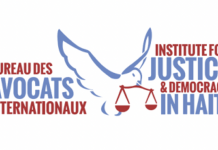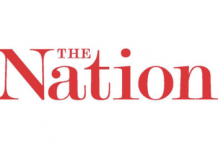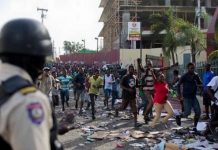Marred by outright fraud, massive voter suppression in the form of intimidation, and violence, the August 9th Haitian legislative election was rejected by the people of Haiti. Yet, in a cynical re-write of history, the OAS, United States, and European Union put their stamp of approval on the election as a “step forward” for democracy.
As usual, the Haitian people resist. They insist on their right to fair elections. Angry protests across Haiti demand that the August 9th election be annulled. Haiti Action Committee fully supports this demand.
Fanmi Lavalas, the party of former president Jean-Bertrand Aristide, immediately declared the sham election “an electoral coup,” calling for its annulment, and demanded that a commission be convened to investigate. Other political parties soon joined this call. Many candidates throughout the country have formed “candidates’ collectives” to defend the Haitian people’s right to free and fair elections.
Below are some examples of the nation-wide pattern of disruption, voter suppression and terror that occurred during this sham election.
THE DECK IS STACKED:
-
Poll watcher badges were only distributed to selected parties – PHTK, Bouclier, Verite, KID – all parties with close ties to Haitian president Michel Martelly.
-
Observer badges were distributed to fake observers, facilitating the movement of armed gangs between polling centers
-
Voters’ lists were not posted as required by the electoral law
-
Sustained gunfire erupted nightly in areas throughout Port-au-Prince and other major cities leading up to the vote. This created an atmosphere of fear and terror; rumors of a curfew and a ban on public transportation were circulated and never dismissed by the authorities, causing people to stay home.
-
Polling places were eliminated in working-class and impoverished communities and consolidated into difficult to access centers. Many people did not know where to vote, and when they did could not get there.
-
Crude and numerous errors in registered voting lists prevented voters from casting their vote, and drove them away from the polls.
DAY OF THE VOTE
-
Poll watchers from PHTK, Bouclier, and Verite and KID were allowed to enter polling sites, while other parties were excluded. By law, representatives of all political parties may observe the voting process.
-
Polling sites opened late or closed early in poor and working class communities; in some departments, close to 50% of the electorate were disenfranchised by sites that were closed due to violence.
-
Throughout the day, Radio Timoun, affiliated with the Aristide Foundation For Democracy, and other radio stations throughout the country broadcast testimony from Haitians who called in to report ballot stuffing, destruction of ballots, armed groups trashing polling sites, and people beaten and killed.
-
Journalists and election observers photographed ballots tossed or stolen at multiple sites.
-
Duly certified election officials were suddenly removed and replaced by Martelly operatives at numerous polling sites.
-
Armed groups of men carrying assault rifles were allowed into polling stations by complicit police and electoral council staff. Photographs show some wearing the t-shirts of Martelly’s PHTK party. Haitian National Police were reported to stand by while ballots were destroyed, sites were trashed and ballots stuffed. The UN was nowhere to be seen.
RESULTS – THE FIX IS IN:
-
Candidates of three parties allied with Martelly – PHTK, Bouclier and Verite – head the list of first-round winners for the legislature.
-
Voter suppression was evidenced in extremely low turnout across the country, especially in the West – Haiti’s largest department, representing 41% of electorate – where violence and closure of voting sites were high.
-
Figures indicate Haiti’s electoral council, the CEP, did not tabulate close to 25% of the votes for Senate and almost 23% of the votes for Deputy.
NO! TO STOLEN ELECTIONS
CEP President Opont defended the elections, saying “These are the realities of the vote in Haiti,” and “Acts of violence are a feature of elections.” These false and belittling characterizations disguise the perpetrators of the violence. These were not random acts– this was systematic government-sponsored violence throughout the country bearing all the features of paramilitary actions reminiscent of Haiti under dictatorship.
Fifteen years ago, free and fair elections brought President Aristide and Fanmi Lavalas to power on a platform of social and economic reform to benefit Haiti’s people. That vote was negated by the 2004 coup led by the US, France and Canada. Now these same powers, the OAS, and the UN are cheering on the Martelly government as the “electoral coup” of August 9th is consolidated.
This is a moment that demands our solidarity. Haitians are reminded of a similar moment in the early years of dictatorship under Francois Duvalier. It has to stop now. We can echo the voices of Haitians protesting stolen elections and pre-determined outcomes. We can override the media embargo on what’s happening in Haiti, get the word out, and stand with Haiti’s popular movement to demand justice and change.





